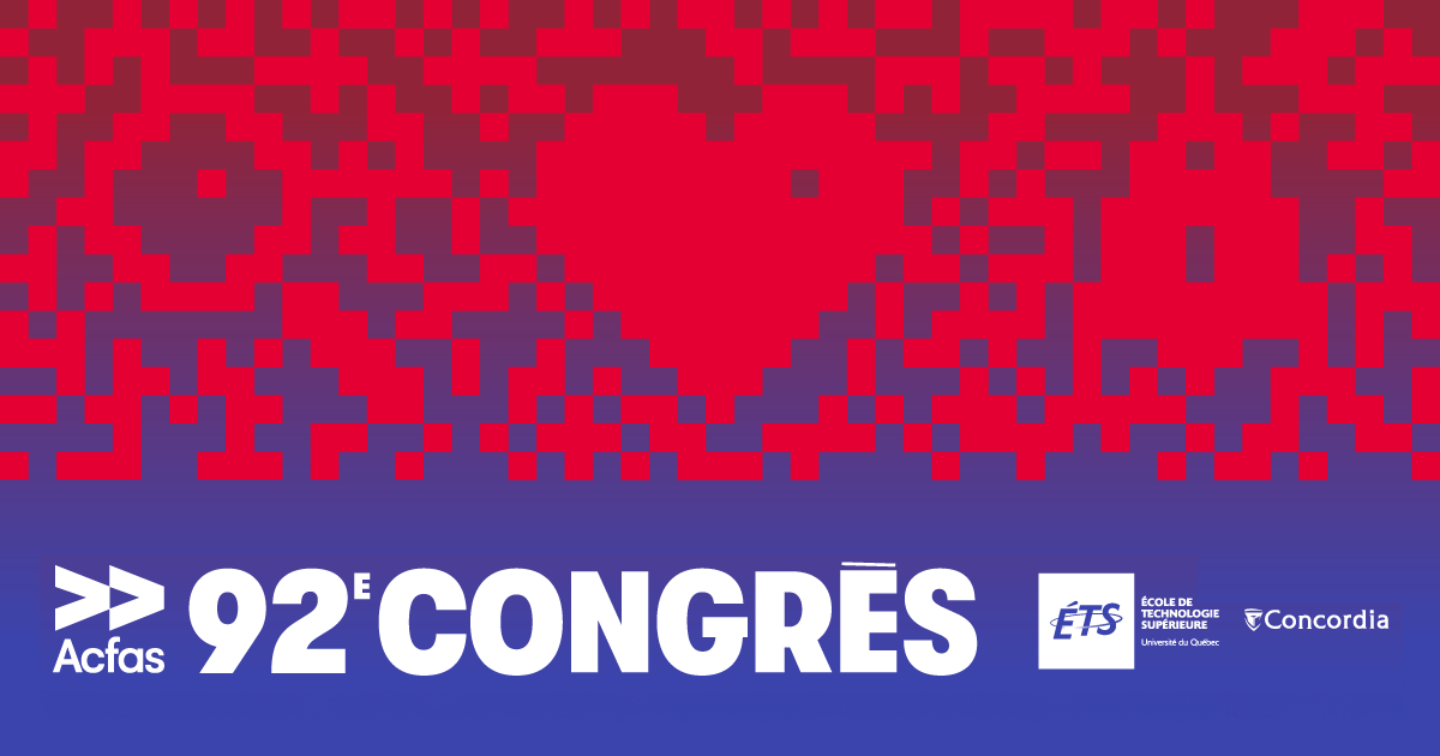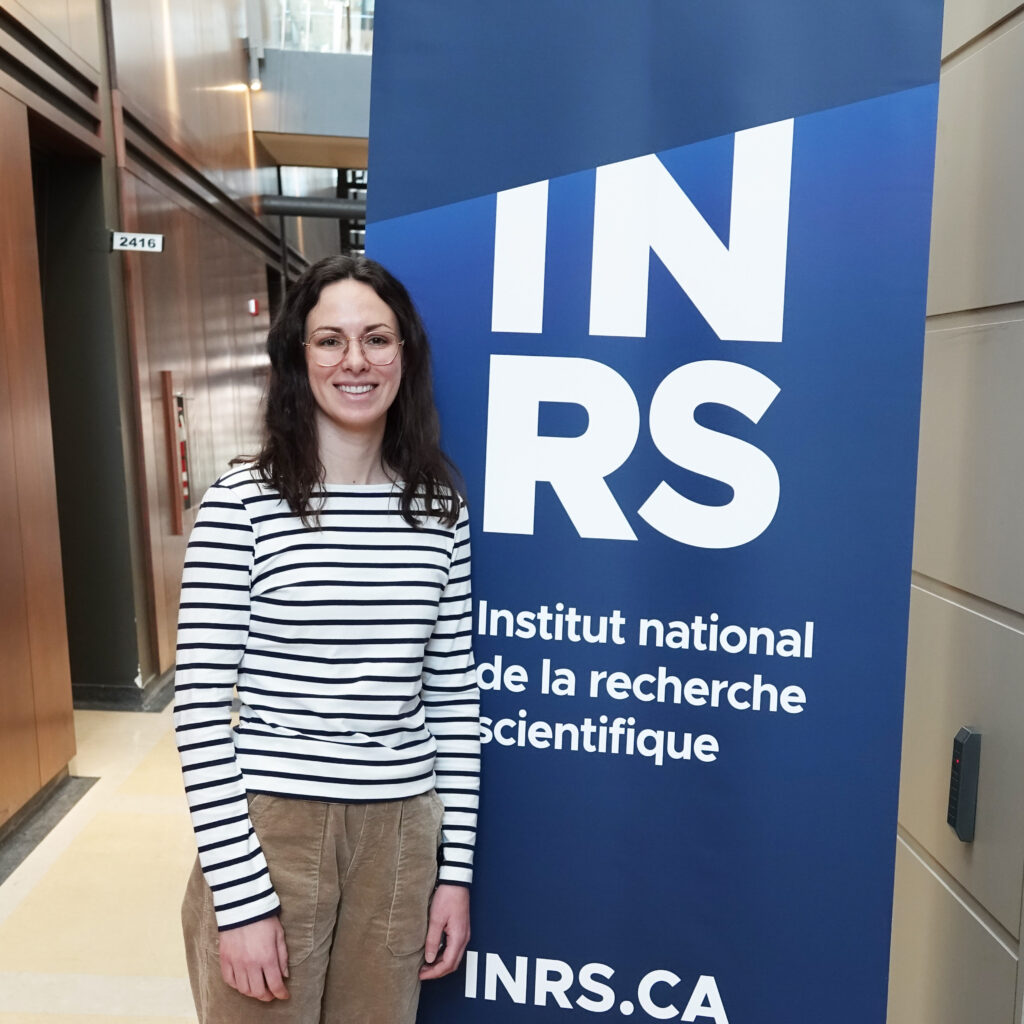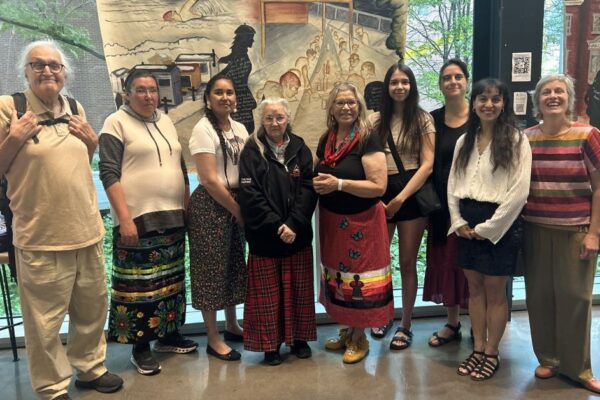- Academic Life
The INRS community at the heart of the biggest scientific French-language event to share its latest advances.

Some 50 members of the INRS community will participate in the 92nd ACFAS Conference under the theme Research at the Heart of Technological and Social Solutions, organized this year by École de technologie supérieure in collaboration with Concordia University. It is an opportunity for the student community, faculty, and administrative staff to present their research and share their expertise and reflections at events, colloquiums, and networking sessions.
Environmental inequities and community health, sustainable mobility and land use, materials sciences and energy transition, social inclusion, cultural industries and artificial intelligence are among the areas of expertise to be addressed by members of the INRS community.
The annual ACFAS Conference is the largest multidisciplinary scientific gathering of La Francophonie. It brings together an average of 6,000 people from Québec, the rest of Canada, and abroad.
The MT180 national final at the Acfas Congress
Marie-Pier Brochu will represent INRS at the national final on May 7, in Montreal.
The doctoral student in Water Sciences won 1st place at the institutional final on April 2 for her presentation “ADN environnemental comme outil de suivi d’espèces animales en situation précaire au Québec”.

INRS attends the 92nd Acfas Congress
Monday, May 5 | Tuesday, May 6 | Wednesday, May 7 | Thursday, May 8 | Friday, May 9 | Open communications – All week
Monday, May 5, 2025
(Du lundi 5 au mercredi 7 mai)
Coresponsables du colloque : Romuald Jamet et Jonathan Roberge
- Adaptation, ruse ou résistance : réponse de l’écosystème culturel québécois aux chants des sirènes de l’IA
Participation INRS : Étienne Grenier
Colloque 6 – Enjeux actuels de la diffusion des savoirs en musique
- Faire découvrir la découvrabilité
- Musique et savoirs en transformation : pratiques numériques et inclusivité
Participation INRS : Elsa Fortant
Colloque 225 – Perspectives interdisciplinaires sur l’innovation des espaces verts urbains
- Accessibilité, aménagement et achalandage : les parcs du grand Montréal
Participation INRS : Victoria Jepson
Colloque 219 – Aménagements routiers durables et sécuritaires
- L’influence de l’environnement routier sur l’initiative de la brigade débarcadère
Participation INRS : Myriam Paré et Marie-Soleil Cloutier
- Jeunesse et habitat : ce que le logement étudiant nous apprend sur une relation bidirectionnelle
Participation INRS : Nick Revington
Colloque 473 – Féminisme numérique aux Nords et aux Suds
- Le mouvement féministe ivoirien : entre engagement en ligne et actions sur le terrain
Participation INRS : Désirée Deneo
Tuesday, May 6, 2025
(Du lundi 5 au mercredi 7 mai)
Coresponsables du colloque : Romuald Jamet et Jonathan Roberge
- L’empreinte prescriptive des plateformes : données et reconfigurations des stratégies de mise en marché musicale
Participation INRS : Elsa Fortant
- Des émotions à la musique, et vice-versa : l’usage des données émotionnelles en musique
Participation INRS : Lou Manuel Arsenault, Camila-Andrea Rodriguez, Romuald Jamet
(Du mardi 6 au mercredi 7 mai)
Coresponsables du colloque : David Myles et Alexandre Chanady
- Le concept de scène : un outil théorique pour penser les dynamiques lesboqueers montréalaises
Participation INRS : Ambre Marionneau
- Attachement au lieu et qualité de vie des personnes LGBTQ+ en milieu rural et périphérique
Participation INRS : Emilie-Jade Fredette
- La patrimonialisation urbaine LGBTQ à Montréal : un outil pour le développement des communautés et des territoires
Participation INRS : Alexandre Chanady
- Queeriser les publics algorithmiques imaginés : pratiques de résistance des jeunes personnes queers sur TikTok
Participation INRS : Vincent Arseneault
- Survol des controverses anti-LGBTQ+ au Québec
Participation INRS : David Myles
- Le sexisme ordinaire, pas notre genre! Exemple d’une mobilisation visant à mettre en lumière le sexisme ordinaire en milieu académique et à lutter contre ses manifestations
Participation INRS : Eve Bernet, Mathilde Broquière, Hermine Counil, Jessica Dozois, Léa Maude Gobeille Paré, Apolline Maurin, Linsey Yvette Mouatcho
(Du mardi 6 au mercredi 7 mai)
Coresponsables du colloque : Cathy Vaillancourt et Isabelle Plante
- Réseau Communautés rurales et éloignées en santé (CARES)
Participation INRS : Cathy Vaillancourt
- La profession : un facteur influençant l’exposition aux perturbateurs endocriniens et leurs effets sur la santé reproductive?
Participation INRS : Marie-Caroline Daguste
- Table ronde : iniquités environnementales en régions rurales et éloignées
Participation INRS : Cathy Vaillancourt
- De pratiques prometteuses à pratiques concluantes : lumière sur la valeur ajoutée de l’évaluation d’initiatives en santé mentale étudiante
Participation INRS : Elizabeth Doiron-Gascon
(Du mardi 6 au jeudi 8 mai)
Coresponsable du colloque : Émilie-Jade Poliquin
- Les ruralités comme enjeu de société stratégique
Participation INRS : Luc-Alain Giraldeau
Ce colloque est coorganisé par l’INRS et six autres institutions partenaires clés de l’écosystème de la recherche sur les ruralités. Il nous permettra de poursuivre la conversation amorcée en amont du dépôt de l’étude d’opportunité qui a permis le financement du Centre Ruralités durables de l’INRS au printemps dernier. Une belle occasion de s’inspirer des meilleures pratiques de recherche collaboratives pour la recherche faite pour, par et avec les communautés rurales.
Dans le cadre de cet événement, soulignons notamment le panel d’ouverture animé par le directeur général, Luc-Alain Giraldeau. Les panélistes y discuteront, selon leurs perspectives complémentaires, de l’importance stratégique des enjeux ruraux pour l’avenir du Québec et du Canada dans le contexte socioéconomique actuel. Ils examineront aussi comment la recherche peut y contribuer, notamment en favorisant la mise en place de politiques publiques à la fois mieux adaptées aux réalités rurales et porteuses pour le positionnement de la province et du pays.
Lors du panel de clôture consacré aux approches innovantes en recherche universitaire, collégiale et interordre, Amélie Forget, directrice d’implantation du Centre Ruralités durables de l’INRS, aura également l’occasion de partager la mission de ce nouveau centre et sa place dans l’écosystème de la recherche. Cette discussion rassemblera les représentantes et représentants du Centre de recherche sur la ruralité de l’Université de Moncton, du Centre de recherche sur le développement territorial (CRDT) et du Centre d’innovation sociale en agriculture (CISA).
Colloque 611 – Mobilité durable et territoire : en route vers une planification intégrée
- L’expérience sensible des aînés dans leurs déplacements à pied : influences sur les habitudes de marche
Participation INRS : Joël Wheeler-Noiseux
Wednesday, May 7, 2025
(Mercredi 7 et jeudi 8 mai)
Coresponsable du colloque : Guy Bellavance
- Des collectifs sous pression : les singularités de l’organisation du travail dans les centres d’artistes
Participation INRS : Guy Bellavance
- Entre tradition et professionnalisation : l’institutionnalisation des ashiqs en Iran et leur intégration dans les collectifs musicaux
Participation INRS : Monire Akbarpourankhayati
Colloque 203 – Matériaux fonctionnels pour le développement durable – CQMF
- Amélioration des cellules solaires à pérovskite fabriquées à l’air libre par l’incorporation simultanée de précurseurs chlorés et de thiocyanate de potassium
Participation INRS : Ahmed Bensekhria, Fiorenzo Vetrone (INRS) et Federico Rosei (INRS)
- Communs du numérique et de l’IA : tisser les relations entre Wikimédia et les GLAM
Participation INRS : Nathalie Casemajor
Colloque 19 – La science pour le politique : développer la recherche sur le conseil scientifique
- Conseil scientifique municipal : pratiques, défis et perspectives
Participation INRS : Philippe Constant
Colloque enjeux de la recherche 18 – Forum des réseaux de thématiques
- Fonds de recherche du Québec – secteur Santé
Coresponsable : Cathy Vaillancourt
(Du mardi 6 au mercredi 7 mai)
Coresponsables du colloque : Cathy Vaillancourt et Isabelle Plante
- Centre intersectoriel d’analyse des perturbateurs endocriniens
Participation INRS : Isabelle Plante
- Table ronde : iniquités environnementales face aux expositions aux produits chimiques
Participation INRS : Géraldine Delbès
- Les lignées cellulaires, des outils pour étudier le danger des perturbateurs endocriniens associé au cancer du sein chez les populations exposées
Participation INRS : Madeleine Lépine
- Exposition périnatale à l’acide perfluoroundécanoïque (PFUdA) : un retard dans le développement de la glande mammaire?
Participation INRS : Julie Morin-Genest et Isabelle Plante
- Milieu de vie et environnement de travail : lorsque la santé est en jeu – l’exemple du cancer de la prostate
Participation INRS : Marie-Elise Parent
(Du mardi 6 au jeudi 8 mai)
Coresponsable du colloque : Émilie-Jade Poliquin
- Atelier collaboratif avec les participantes et les participants
Participation INRS : Amélie Forget
(Du mercredi 7 au vendredi 9 mai)
Coresponsable du colloque : Kulbir Ghuman
Colloque 472 – Approches biopolitiques des âges de la vie
Coresponsables du colloque : Leslie Kapo et Pierre Tircher
- La reconfiguration des politiques publiques de l’emploi des personnes âgées au Québec
Participation INRS : Pierre Tircher
Colloque 408 – Le travail social en contexte numérique : systèmes, acteurs et actions
- Inclusion sociale à l’ère du numérique au Québec – Pour qui? Par qui? De quelle façon?
Participation INRS : Émilie Michaud et Virginie Hébert
Thursday, May 8, 2025
- Table ronde – Impacts potentiels de l’application de la nouvelle cartographie des zones inondables sur le territoire du Québec
Participation INRS : Michel Leclerc
- Inondations au Québec : cartographie en temps quasi réel par imagerie satellitaire radar et optique et apprentissage profond
Participation INRS : Claudie Ratté-Fortin
Coresponsable du colloque : Fateh Chebana
- Distributions multivariées optimales pour l’analyse des crues au Canada dans un contexte de changements climatiques
Participation INRS : Dorsaf Goutali et Fateh Chebana
- Étude du risque hydrologique dans un contexte multivarié non stationnaire
Participation INRS : Amira Fredj, Dorsaf Goutali et Fateh Chebana
- Évaluation du risque hydrologique en absence de l’homogénéité des données : le cas des crues
Participation INRS : Emna Gontara et Fateh Chebana
- Table ronde
Participation INRS : Fateh Chebana, Amira Fredj, Emna Gontara et Dorsaf Goutali
(Du mardi 6 au jeudi 8 mai)
Coresponsable du colloque : Émilie-Jade Poliquin
- La recherche universitaire, collégiale et interordre et ses approches innovantes ancrées dans les communautés rurales
Participation INRS : Amélie Forget
Colloque 609 – Politiques éducatives et parcours étudiants dans l’enseignement postsecondaire
- L’influence de l’origine sociale sur les parcours des étudiantes et des étudiants dans un système scolaire à double transition : le cas du Québec
Participation INRS : Natacha Prats
- La pandémie de la COVID-19 et l’interruption des études : le rôle des inégalités
Participation INRS : Benoît Laplante
- La ville nouvelle : urbanisation rapide et enjeux sociaux. Le cas d’Ali Mendjeli à Constantine, Algérie
Participation INRS : Dorhane Manel Racha Malim Malim
Friday, May 9, 2025
Colloque 410 – Travaux de la relève en transfert et mobilisation de connaissances
- Les pratiques prometteuses de transfert des connaissances en santé publique en contextes autochtones
Participation INRS : Julie Tremblay-Devirieux
- Entretien – Former en transfert et mobilisation des connaissances
- Table ronde – Ce que disent les personnes expertes
Participation INRS : Hélène Belleau
- Contamination potentielle de l’eau potable dans les puits privés lors d’inondations
Participation INRS : Geneviève Bordeleau, Yachar ben Arous, Karem Chokmani
- Table ronde – Bonnes pratiques de l’intersectorialité dans la recherche sur les inondations
Participation INRS : Geneviève Bordeleau
Colloque 609 – Politiques éducatives et parcours étudiants dans l’enseignement postsecondaire
- L’influence du revenu des grands-parents sur l’accès à l’EPS au Canada
Participation INRS : Xavier St-Denis et Natacha Prats
- Résilience climatique et adaptation urbaine : défis et opportunités pour les métropoles vulnérables du Sud
Participation INRS : Dorhane Manel Racha Malim Malim
- Intermédiation algorithmique en région éloignée : tempête politique en vue sur l’archipel
Participation INRS : François-Olivier Picard
- Intermédiation algorithmique en région éloignée : tempête politique en vue sur l’archipel
Participation INRS : François-Olivier Picard
Open communications – All week
- Sourciers et sourcières des temps modernes : une étude scientifique sur la méthode traditionnelle de radiesthésie
Participation INRS : Geneviève Bordeleau, Bernard Giroux et Erwan Gloaguen
406 – Nature, transformation et gouvernance de la société et des institutions
- Stratification de l’offre scolaire au Québec : étude ethnographique d’une école secondaire publique
Participation INRS : Véronique Grenier
- Scrutins à vote unique transférable : la tendance se maintient-elle?
Participation INRS : Jean-Charles Grégoire
Enjoy the conference!



